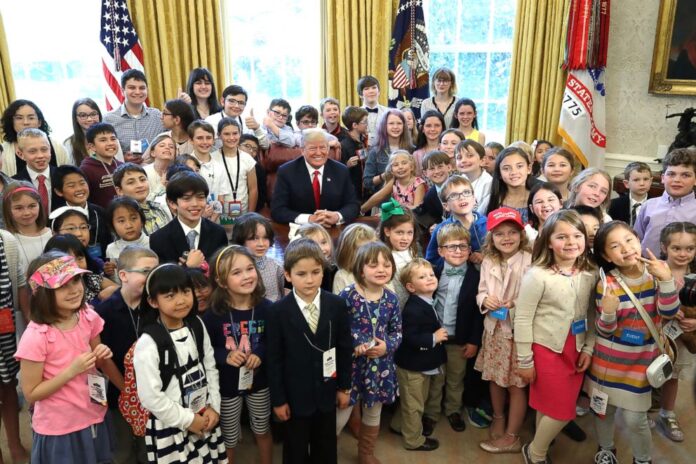Hey everyone, Samuel Lopez here, legal analyst and journalist for USA Herald. Today, I want to talk to you about a powerful move by President Trump that’s making waves across the nation: his new Executive Order aimed at ending COVID-19 vaccine mandates in schools. But, as always, there’s more to the story, especially when it comes to our most vulnerable children.
In This Report:
- Mandate’s End: President Trump’s Executive Order, signed February 15, 2025, pulls federal funding from schools that enforce COVID-19 vaccine mandates, championing parental choice.
- Foster Care Crossroads: The order doesn’t directly address state-run agencies like CPS, leaving the door open for continued vaccine mandates for children in foster care.
- State-Level Showdown: The real battleground for protecting foster children’s rights may lie in state legislatures and courts, where the fight against forced vaccinations continues.
The Executive Order: A Win for Parental Rights
President Trump’s recent Executive Order is a clear statement: Washington is stepping in to protect students from being forced to get the COVID-19 vaccine as a condition of attending school. The order specifically states that federal funds will be withheld from educational institutions that mandate the vaccine. The reasoning? The President believes that parents should have the right to decide what’s best for their children, especially when the risk of serious illness from COVID-19 is low for young people.
“Parents and young adults should be empowered with accurate data…and left free to make their own decisions accordingly,” the order states. “Given the incredibly low risk of serious COVID-19 illness for children and young adults, threatening to shut them out of an education is an intolerable infringement on personal freedom.”
This is a big win for those who believe in parental choice and individual liberty. It sends a strong message that the government shouldn’t overreach when it comes to personal health decisions. But what about the kids who don’t have parents making those decisions for them?
The Foster Care Conundrum: Are Children Protected?
Here’s where things get complicated. The Executive Order focuses on schools, but it doesn’t directly address state-run agencies like Child Protective Services (CPS). During the height of the pandemic (and even now), some law firms saw that many CPS agencies across the country were mandating the COVID-19 vaccine for children entering foster care, sometimes against the wishes of biological or foster parents.
Think about this: a child enters the foster care system, often due to circumstances beyond their control. Then, they’re told they have to get a vaccine, even if their parents object. And if the parents refuse? They could face the threat of having their child removed from their home, if the child has not already been placed in protective foster care. It’s a terrifying scenario.
The question now is: will Trump’s Executive Order stop CPS from requiring these children to be vaccinated with the COVID-vaccine, just as it has stopped schools from requiring it, if they want to continue receiving their federal funding?
CPS and Vaccine Mandates: A Gray Area
To understand this, we need to delve into the legal framework. State laws generally give CPS broad authority to make health decisions for children in their care, especially those who are wards of the state without parental guardianship. This authority is often justified by the need to protect the child’s best interests and ensure public health.
However, this authority isn’t absolute. It’s subject to state-specific regulations and court oversight. And that’s where the potential for change lies.
How the Executive Order Could Impact CPS
While the Executive Order doesn’t directly mention CPS, it could have indirect effects:
State Policy Reevaluation: With the federal government taking a strong stance against vaccine mandates, states might be more inclined to review their own policies regarding child welfare. They may align with the federal position to avoid potential repercussions or public backlash.
Legal Challenges: The order could inspire legal challenges at the state level, questioning CPS’s authority to mandate vaccines without parental consent. This could lead to more emphasis on parental rights in medical decisions.
Public Opinion: The Executive Order could sway public opinion, putting pressure on CPS to align with the new federal direction. This could lead to a reduction or elimination of vaccine mandates in foster care, especially for the politically charged COVID-19 vaccine.
The Limitations: Why It’s Not a Done Deal
It’s important to remember that child welfare is primarily a state issue. States have considerable autonomy in managing foster care, including medical decisions for children in their care. The Executive Order might not have direct legal authority over state CPS operations unless it’s tied to federal funding or new legislation.
President Trump’s Executive Order is a significant step towards protecting individual liberties and parental rights. But it’s just the beginning. We need to continue the fight at the state level to ensure that all children, including those in foster care, are protected from forced medical procedures.
I encourage you to contact your state representatives and voice your concerns. Let them know that you believe in medical freedom and parental choice. Together, we can make a difference in the lives of these vulnerable children.
Fact-Check Section
For further reading and to verify the information in this article, the following sources provide important context:



